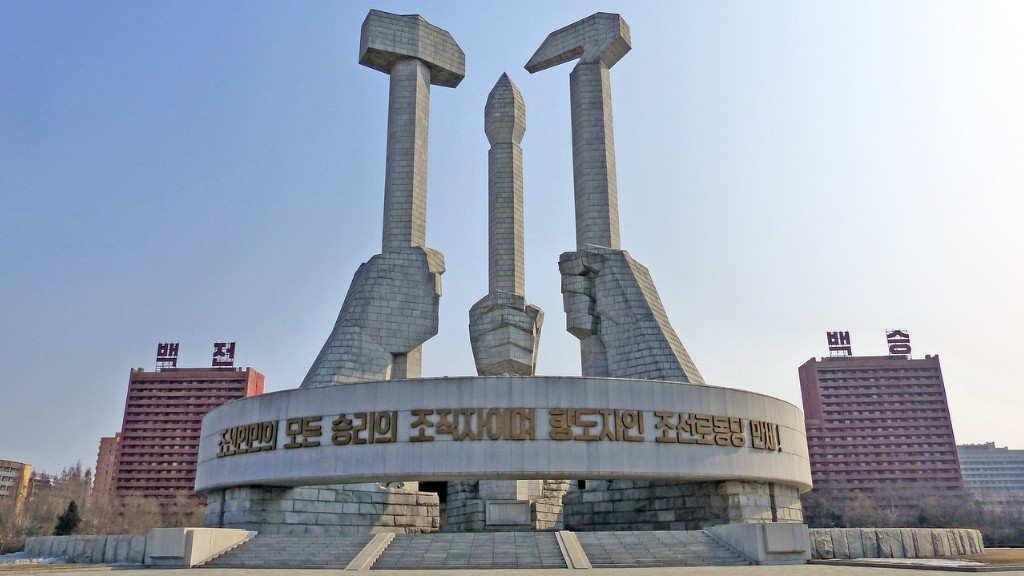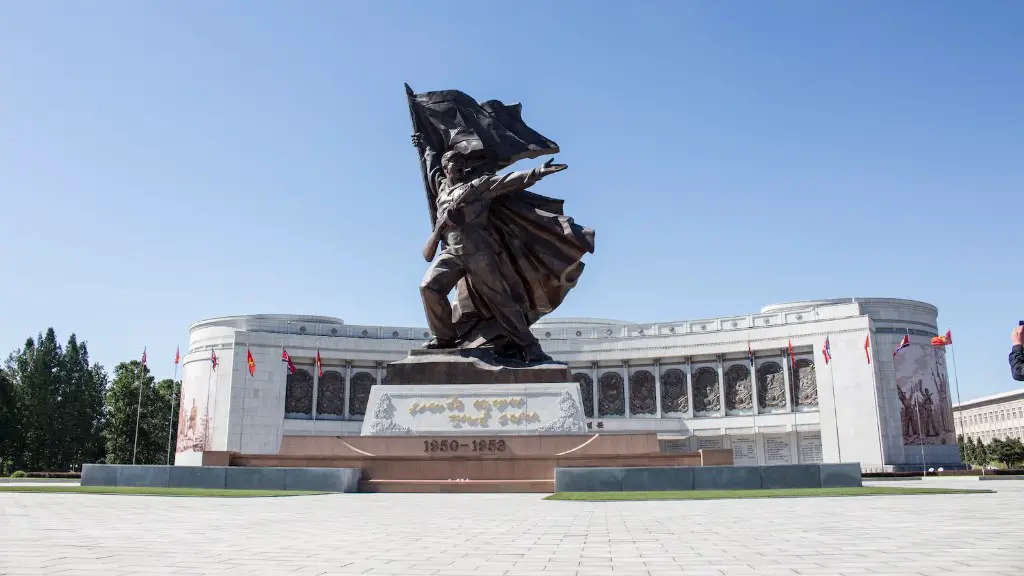Underlying Causes
North Korea’s animosity towards America has been present since the Korean War. In this devastating conflict, United States forces led a united Korean attack against the North Korean forces, which was supported by the Chinese. The war resulted in the division of the Koreas and ultimately led to the demonization of the US by North Korea. From the perspective of the North Korean government, the US is to blame for this division and the suffering of their people.
The animosity further stems from the US’s attempts to contain North Korea’s nuclear ambitions. North Korea feels threatened by the US’s military presence in South Korea, which is seen as an infringement upon their sovereignty. North Korea also perceives harsh sanctions, imposed by the US, to be a form of aggression. To add fuel to the fire, the US’s aggressive rhetoric and shows of military might only further the impression that the US is a hostile force.
In addition to these issues, the US has a long history of meddling in North Korean affairs. From arming South Korea with nuclear weapons to the CIA-backed failed coup attempt on Kim Il-sung, North Korea has seen the US as a menacing force for years. To show their strength and to prevent further interference from the US, North Korea has invested heavily in nuclear capabilities, solidifying their role as a nuclear-armed state.
Propaganda and Psychological Effects
In tandem with the underlying causes, the North Korean government relies on propaganda to enforce its anti-American sentiment with the people. The North Korean government continually demonizes the US and its allies in their media, painting them as dangerous threats to their way of life. This propaganda serves as a way to instill loyalty into its people and create a sense of security.
In addition to this, Western media is strictly forbidden in North Korea. Without any access to the outside world, North Koreans are unable to get a fair, unbiased opinion on the US. This only reinforces the message that the US is a hostile force and reinforces the fear of them.
The psychological effects of this are significant, as the North Korean people have become conditioned to fear and hate the US. To an extent, this is a natural reaction to their government’s propaganda and their lack of access to external media. It is clear that North Koreans, from the leadership down to the average citizen, hate the US for a variety of reasons.
International Relevance
This deep-rooted animosity towards the US is further compounded by the North Korean government’s position in international affairs. North Korea is a pariah state, with the US, alongside other countries, attempting to isolate them economically and diplomatically. North Korea is also considered to be a rogue state, with the US pushing them to the international fringe. This plays a role in North Korea’s hatred of the US, as they feel that they are not seen as an equal.
In addition to this, the US’s meddling in North Korean affairs is seen as a direct insult to their sovereignty. This, combined with economic sanctions and other veiled threats, serves to increase the rift between North Korea and the US. Moreover, North Korea views the US’s diplomatic efforts in the region as an attempt to expand their influence and further increase their global dominance.
The US’s role in international affairs, as well as its presence in North Korea, has only served to increase North Korea’s hostility towards them.
Importance of Understanding
In order to understand North Korea’s hatred of the US, it is important to take a step back and look at the larger picture. The US has acted as a hostile force in North Korea for decades, making it a natural reaction for the North Korean people to hate them. This is compounded by the North Korean government’s use of propaganda and their strategic position in international affairs.
Moreover, it is important to note that North Korea’s hatred of the US is not without reason. It is a natural reaction to what they perceive as aggression, threats and interference from the US. Understanding this helps to place North Korea’s feelings in perspective and to empathize with the plight of the North Korean people.
US- North Korea Relations
The US-North Korea relations fray has been further broken by North Korea’s continual breaches of international law and human rights violations. Continual testing of nuclear weapons, massive military presence along the border, threats to other countries and its disregard of the United Nations’ security council have all been condemned by the US, furthering their animosity towards North Korea.
Despite this, there are efforts towards diplomatic talks. US president Donald Trump has had multiple meetings with North Korea’s leader, Kim Jong-un, in an effort to try and ease the tensions between both countries, although these meetings have been widely seen as unsuccessful. The failure of several agreements and peace treaties has led to an escalation of tensions. In the most recent talks, North Korea refused to disarm and accused the US of sabotaging the peace process.
These tensions have been building for decades and, despite the talks, relations seem unlikely to improve for the foreseeable future. This only serves to heighten the mistrust between the two nations and solidify the hostile environment between them.
Potential Solutions
It is clear that North Korea’s hatred of the US is integral to its national identity. Even so, it is possible to find a path forward that is beneficial to both nations. The US must take steps to reduce the tension between them and show North Korea that they are open to diplomatic solutions.
The US should not seek to impose their will upon North Korea, but rather to work together in a spirit of mutual understanding. This would involve lifting sanctions, providing economic aid, and working towards debt relief for North Korea. These efforts would show that the US is dedicated to improving relations, and would help to alleviate the North Korean government’s mistrust of the US.
In addition to this, the US should also work to improve its relationship with North Korea’s allies, such as China. This would allow them to become involved in diplomatic talks and create an easier path to compromise and peace.
Ultimately, there is hope for a more peaceful US-North Korea relationship, but it requires effort and dedication from both sides.
Humanitarian Role
As the conflict persists, millions of North Koreans suffer from famine, poverty and lack of access to basic services. For example, nearly a quarter of the population is malnourished, with over 90% living in poverty. The US must recognize this suffering, and work to alleviate it.
A few efforts have been made, such as the provision of humanitarian aid and the establishment of economic exchanges. However, the restrictions imposed by the US and other countries, as well as the interference from North Korea’s allies, have severely limited these efforts.
To truly make a difference, the US must work with international partners, including North Korea’s allies, to find a common solution. In the short term, this would involve the provision of food, water and medical supplies to those in need. In the long term, this would involve the establishment of economic exchanges and the improvement of infrastructure.
It is clear that the US plays an important role in the alleviation of suffering in North Korea, but they must continue to work towards diplomatic solutions in order to truly make a difference.
Future of US-North Korea Relations
As the tension between the US and North Korea persists, it is important to consider the long-term implications of this conflict. This animosity seems unlikely to change in the near future and will continue to create tension in the region. This could, potentially, lead to an escalation of the conflict, with North Korea and their allies pitted against the US and its allies. This would have devastating consequences for the region, and could potentially lead to a major war.
The US must continue to work towards a diplomatic solution to this conflict, while also preventing the rearmament of North Korean forces. In addition, the US should focus on improving relations with North Korea’s allies, as this is a key factor in the resolution of this conflict.
Ultimately, the future of US-North Korea relations is uncertain, but it is important to maintain a commitment to peace. With the right effort, it is possible to overcome this animosity and to create a brighter future for the region.





